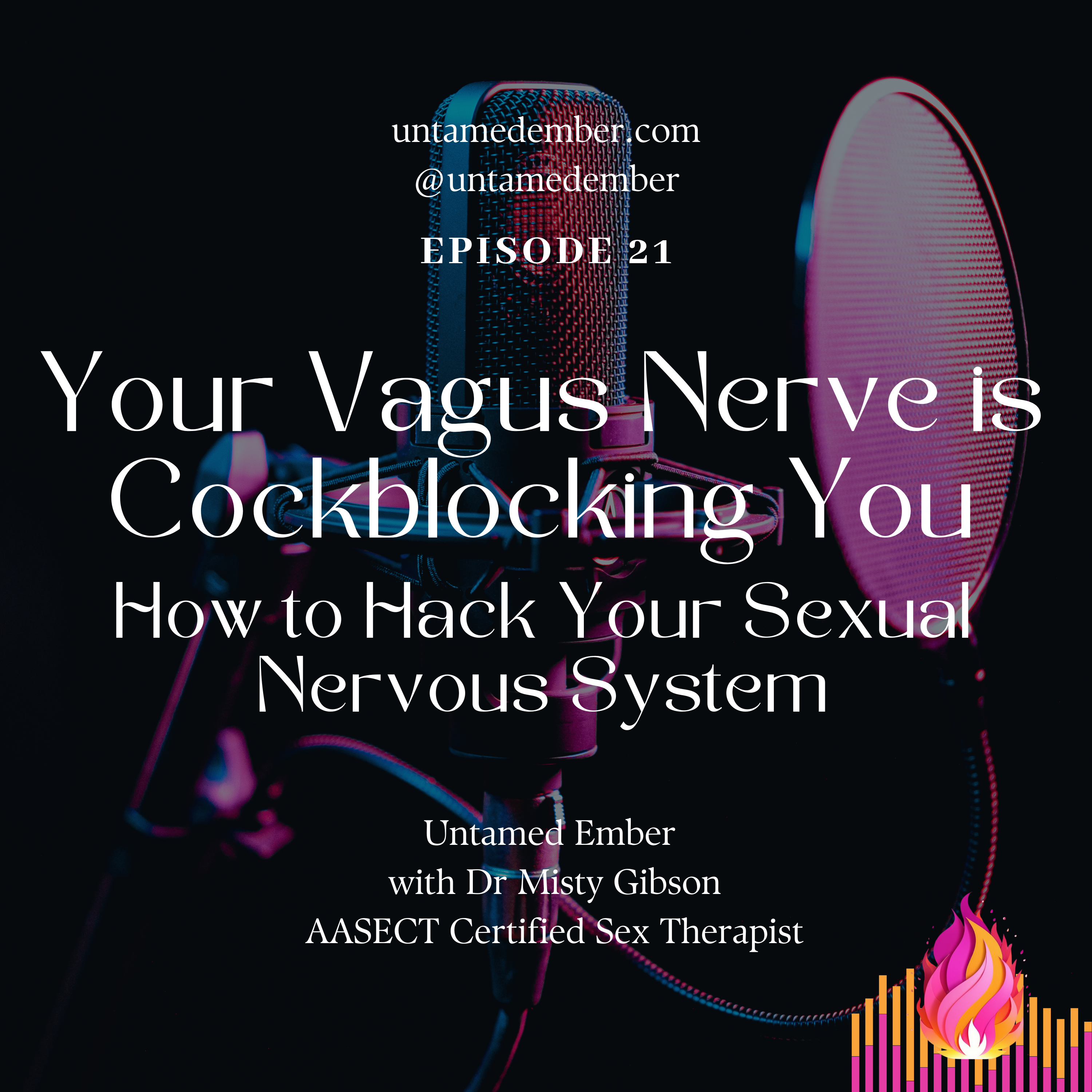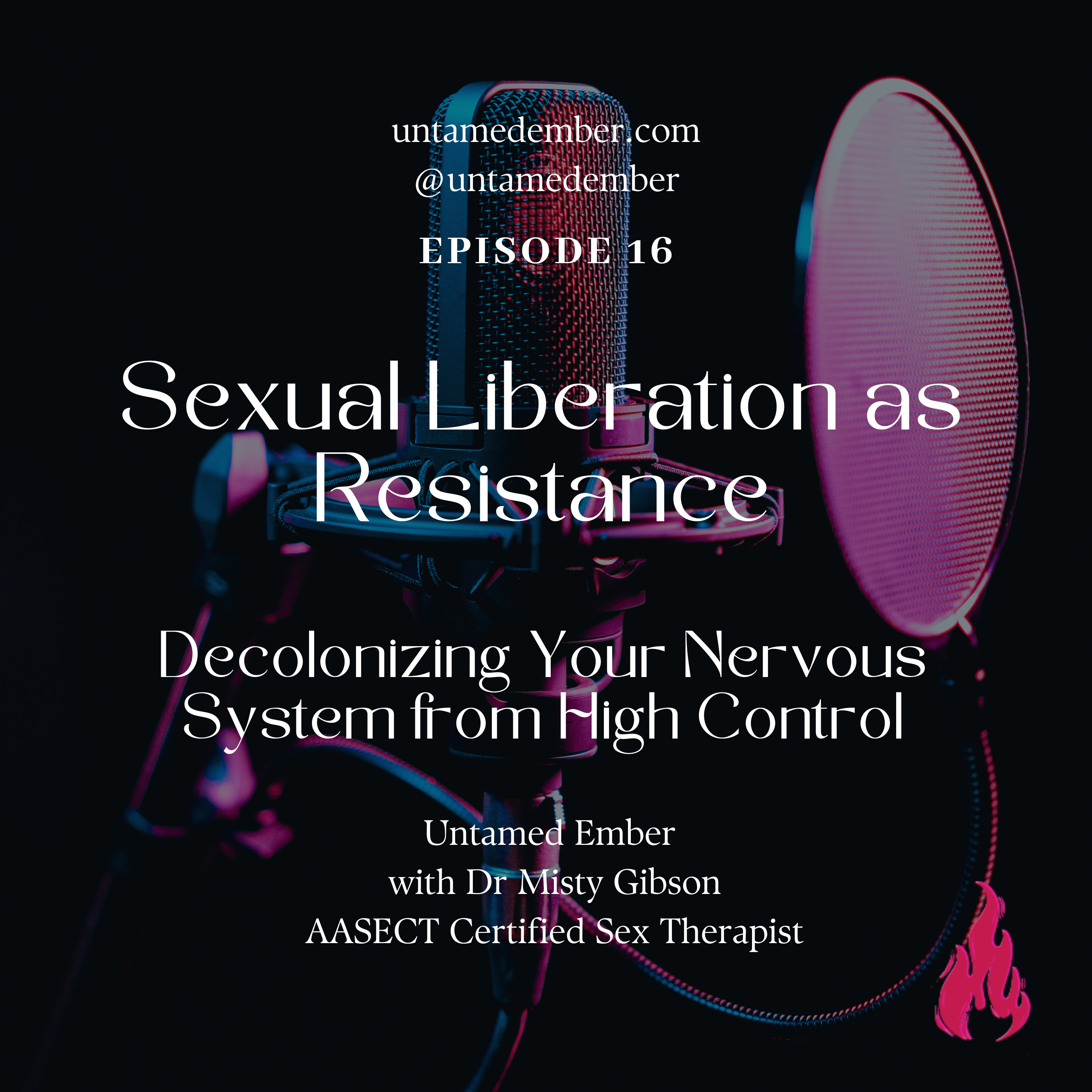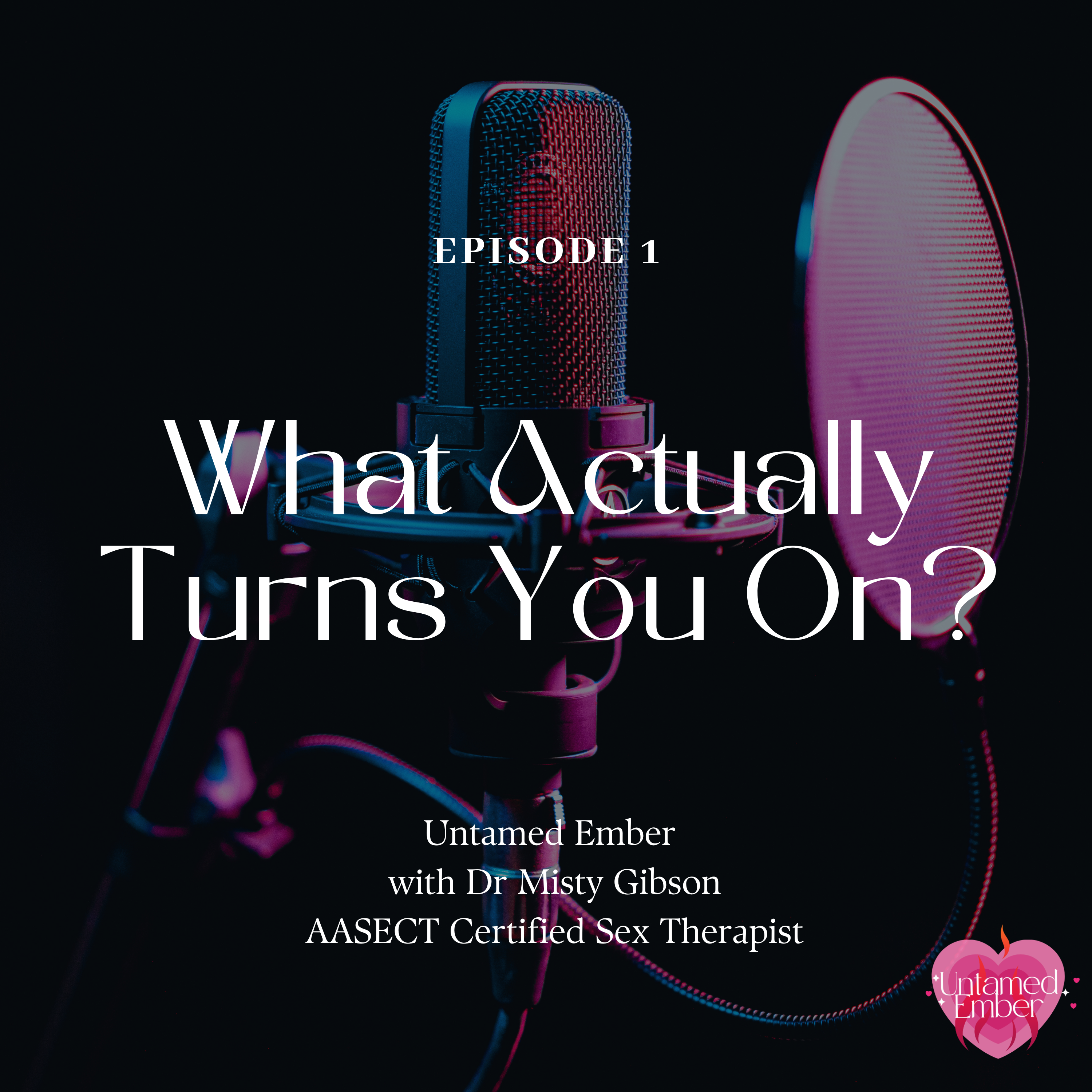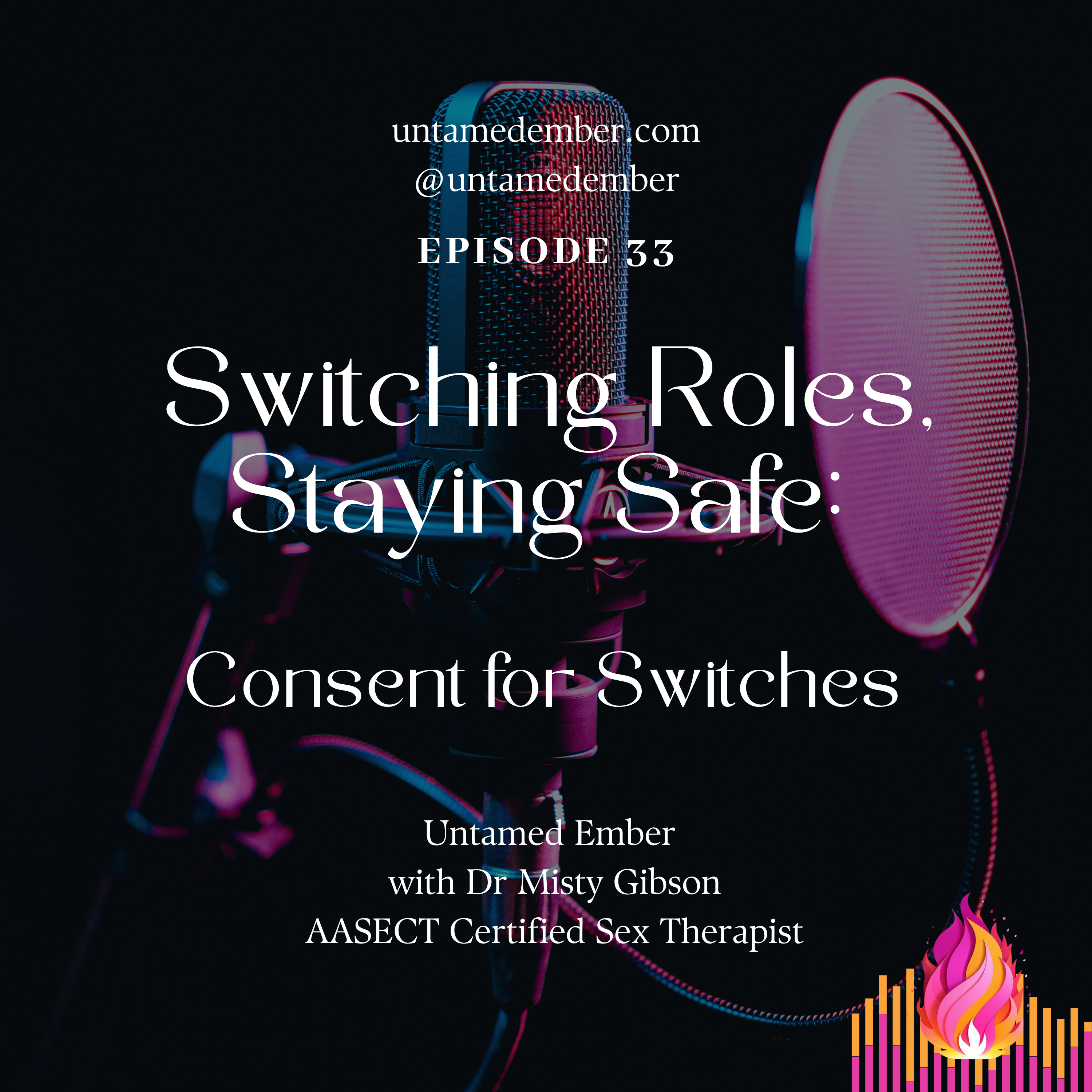Episode Transcript
[00:00:00] So there I was, explaining to my friend why I kept getting dysregulated during sex, halfway through, even though I was genuinely attracted to my partner, and she interrupted me mid sentence to ask, have you considered that your vagus nerve might be having commitment issues?
[00:00:15] What? Here's the thing nobody tells you about having a chronically dysregulated nervous system. Your vagus nerve, that crucial highway between your brain and your body, can basically become the world's most inconveniently timed bouncer deciding to shut down the party. Right? Right when things are getting good. I'm talking about that supremely frustrating experience where you start a sexual encounter feeling genuinely turned on and connected. And then somewhere between foreplay and anything more intense, your body just nopes out.
[00:00:48] Not in an obvious way. Not like you're having a panic attack or feeling unsafe. More like someone slowly turned down the volume on your entire nervous system until you're going through the motions, but feeling approximately as sexually present as a piece of toast.
[00:01:04] Or maybe you're the person who can't seem to get aroused in the first place, no matter how much you want to, no matter how attractive your partner is, no matter how much mental foreplay you've done, your brain is writing enthusiastic consent forms while your body is apparently stuck in airplane mode. Or perhaps you're dealing with the opposite problem. You get so overstimulated during sex that your nervous system goes into hyperdrive.
[00:01:31] Your heart races not in a good way, your breathing gets shallow, your skin feels too sensitive, and suddenly what should feel pleasurable starts feeling as hell. If any of this sounds familiar, welcome to the club of people whose vagus nerve has apparently never heard of timing. Hey, loves. This is Dr. Misty with Untamed Ember, where we talk about sex, shame, the nervous system, and today, why that wandering nerve in your body might be the reason you can't stay present for pleasure. Today we're diving deep into vagal tone, which is basically how well your nervous system's communication highway is functioning and how chronic stress, neurodivergence, and trauma can turn your vagus nerve from a pleasure supporting ally into a sexual saboteur. Here is what's wild. Most of us know our nervous system affects our sexuality, but. But we don't realize just how specifically and practically we can work with our vagal tone to actually improve our capacity for sexual presence and pleasure. We're not just talking about relaxation techniques or general stress management. We're talking about targeted interventions that can literally change how your nervous system responds to sexual situations. Before we get into the juicy stuff about how to hack your sexual nervous system, let's talk about what the hell your vagus nerve actually is. Because most people have heard the term but have no idea why it matters for their sex life. Your vagus nerve is like the body's information superhighway. It's the longest cranial nerve running from your brain stem all the way down to your abdomen, connecting your brain to pretty much every major organ system. It's constantly sending information back and forth about what's happening in your body and whether you're safe or under threat. When your vagus nerve is functioning well, what we call good vagal tone, it acts like a skilled mediator between your thinking brain and your body. It helps you stay calm under pressure, recover quickly from stress, and most importantly for our purposes, it allows you to experience pleasurable sensations without your nervous system freaking out about vulnerability.
[00:03:45] But when your vagal tone is poor, which happens with chronic stress, trauma, neurodivergence, or just living in this garbage fire of a world, your vagus nerve becomes like that friend who always assumes the worst about every situation. It starts interpreting normal sexual arousal as potential danger, treating intimate vulnerability like a threat to survival. Here's where this gets really specific to sexual experience.
[00:04:11] Your vagus nerve directly affects your heart rate variability, which determines whether your heart speeding up during arousal feels exciting or terrifying.
[00:04:21] With good vagal tone, increased heart rate.
[00:04:24] Increased heart rate during sex feels like arousal building. With poor vagal tone, it can trigger anxiety or panic. It also directly affects your breathing patterns. The vagus nerve controls your diaphragm, so vagal dysfunction often shows up as shallow, restricted breathing that makes it impossible to relax into sexual sensation. And another thing that it directly affects is your digestive system. Ever notice how stress kills your appetite? Or how anxiety gives you stomach issues? The vagus nerve controls digestion. When the vagus nerves regulated, your body literally can't rest and digest, which includes being receptive to sexual experience.
[00:05:06] One other thing that it controls is your facial expressions and voice.
[00:05:11] The vagus nerve controls the muscles of facial expression and vocalization. Poor vagal tone can make it hard to communicate during sex, express pleasure naturally, or make eye contact.
[00:05:23] For neurodivergent folks, this gets even more complex.
[00:05:27] Many of us naturally have lower vagal tone due to chronic nervous system activation. From living in a world that wasn't designed for our brains, we're often in a state of chronic hypervigilance or shutdown, which means our baseline nervous system state isn't conducive to the kind of relaxed arousal that makes sex enjoyable. If you're adhd, autistic, or otherwise neurodivergent, your nervous system is likely dealing with chronic overstimulation from sensory processing differences, masking all day or just existing in neurotypical spaces. And by the time you get to sexual situations, your nervous system might already be maxed out. Your nervous system might also be dealing with difficulty with transitions. Neurodivergent brains often need more time to shift between activities and mental states. Going from daily life stress directly into sexual intimacy without transition time can leave your vagus nerve confused about what's happening. Your nervous system is also likely dealing with hypervigilance around social cues and performance.
[00:06:32] If you've spent your whole life trying to figure out how to act normal in sexual situations, it can trigger intense performance anxiety that dysregulates your vagus nerve. Sensory processing differences can also make typical sexual environments overwhelming. Scratchy sheets, certain temperatures, unexpected sounds, or unpredictable touch can all trigger vagal shutdown. The result? Your vagus nerve starts treating sex like a threat to be managed rather than a pleasure to be enjoyed. Let's get specific about how poor vagal tone shows up during sexual experiences, because recognizing these patterns is the first step to changing them. First, let's talk about the arousal anxiety loop.
[00:07:15] This is when your nervous system can't distinguish between sexual excitement and anxiety because the physical sensations are so similar. Your heart rate increases, your breathing changes, your skin gets flushed. All normal parts of arousal. But if your vagal tone is poor, your nervous system interprets these changes as signs of danger.
[00:07:36] You might start getting aroused and then suddenly feel anxious for no reason. Or you might avoid sexual situations entirely because your body has learned to associate arousal with panic. This is especially common for people with anxiety disorders or trauma histories, but it can happen to anyone with chronic nervous system dysregulation.
[00:07:56] Next is the shutdown response. This is when your vagus nerve decides that sexual intensity is too much to handle and just turns everything off.
[00:08:06] You might start sexual activity feeling connected and present, and then gradually notice yourself becoming numb, disconnected, or like you're watching everything happen from outside of your body. This isn't the same as dissociation that we've talked about previously. This is specifically for your vagus nerve, downregulating your entire system as a protective mechanism.
[00:08:29] You're not leaving your body. Your body is just going offline to avoid overwhelm.
[00:08:34] Next, the hyperarousal trap. This is when sexual stimulation sends your nervous system into overdrive instead of Pleasure. Every touch feels too intense. Your mind races. You can't stop thinking about how you look or sound, and the whole experience becomes overwhelming rather than enjoyable. Your vagus nerve is supposed to help you stay calm and present during intensity. But when it's not functioning well, intensity of any kind, even pleasurable intensity, can trigger fight or flight responses. Poor vagal tone often comes with hypervigilance, which means your nervous system is constantly scanning for threats during sex. This shows up as constant self monitoring. Am I doing this right? Do I sound weird? Is my partner enjoying this? How long is this taking?
[00:09:22] Instead of being present with sensation and connection, you're stuck in your head analyzing your performance.
[00:09:28] Your vagus nerve is treating your partner's responses like data to be processed for safety rather than connection to be enjoyed. Here's the thing that makes this whole situation extra frustrating.
[00:09:40] Almost everything about modern life is designed to dysregulate your vagus nerve. Which means most of us are walking around with chronically poor vagal tone without even realizing it. Think about your typical day. You wake up to an alarm vagal shock. Immediately check your phone for anxiety inducing news and emails. More vagal disruption.
[00:10:02] Rush through morning routines. Chronic activation.
[00:10:06] Sit in traffic or cramped public transport. Stress and physical restriction. Spend eight hours in fluorescent lighting doing tasks that may or may not feel meaningful. More activation.
[00:10:18] Then try to transition directly into intimate, vulnerable sexual connection.
[00:10:23] Your poor vagus nerve has been under assault all day, and then you expect it to suddenly support relaxed, present, pleasurable sexual experience.
[00:10:32] It's like running a marathon and then expecting to immediately meditate. For neurodivergent folks, this daily assault course is even more intense. You're dealing with masking all day, which requires enormous nervous system resources to constantly monitor and adjust your behavior to appear neurotypical.
[00:10:52] Sensory overwhelm from environments designed for neurotypical sensory processing. Fluorescent lights. Open office spaces. Unexpected sounds. Scratchy fabrics.
[00:11:02] Executive functioning. Demands that exhaust your nervous system. Remembering things that don't come naturally. Organizing systems that don't match your brain. Forcing focus when your attention wants to be elsewhere. Social anxiety and hypervigilance from a lifetime of feeling different and not understanding social rules.
[00:11:21] By the time you get home, your vagus nerve is basically running on fumes.
[00:11:26] The idea of having the nervous system bandwidth for sexual vulnerability and pleasure feels impossible. And then there are the cultural messages that specifically target vagal function around sexuality. Good sex should be spontaneous, which ignores the fact that dysregulated nervous systems need time and intention to transition into states conducive to pleasure.
[00:11:48] If you're attracted to someone, your body should automatically respond, which shames people whose nervous systems need specific conditions to feel safe enough for arousal. Relaxation techniques should be enough, which oversimplifies the complex neurobiological factors that affect sexual response. These messages create additional performance pressure that further dysregulate your vagus nerve, creating a vicious cycle where stress about sexual performance makes sense. Sexual performance more difficult now for the good stuff. Specific, practical interventions that can improve your vagal tone and consequently, your capacity for sexual presence and pleasure. Let's start with direct vagus nerve stimulation practices that literally activate your vagus nerve to improve its tone over time. Cold exposure is one of the most effective vagus nerve stimulators.
[00:12:44] This doesn't mean you need to become one of those people who takes ice baths and posts about it on Instagram. It can be as simple as ending your shower with 30 seconds of cold water, holding ice cubes, or splashing cold water on your face. The cold activates your vagus nerve's parasympathetic response. It's like hitting a reset button for your nervous system. Try doing this before sexual encounters as a way to shift your nervous system into a more regulated state.
[00:13:10] Humming, singing, and vocal toning are incredibly effective. Because the vagus nerve innervates your vocal cords, the vibrations directly stimulate vagal function. This is why some people naturally make sounds during sex. Their nervous system is actually trying to regulate itself. Try humming in the shower, singing in the car, or even making intentional sounds during sexual activity.
[00:13:37] You're not just expressing pleasure, you're actively supporting your nervous system regulation.
[00:13:42] Gargling is another simple but effective technique. The vagus nerve controls throat muscles, so vigorous gargling with water stimulates vagal tone. It sounds ridiculous, but 30 seconds of enthusiastic gargling can actually shift your nervous system. State your breath is one of the most direct ways to influence vagal tone, and specific breathing patterns can prepare your nervous system for sexual connection. The 4, 7, 8 breath is particularly effective. Inhale for four counts, hold for seven, exhale for eight. The extended exhale activates your parasympathetic nervous system and improves vagal tone. Try doing this for a few cycles before sexual activity. Diaphragmatic breathing Breathe deep into your belly rather than your chest.
[00:14:31] Breathing deep into your belly rather than your chest directly stimulates the vagus nerve because it runs right through your diaphragm.
[00:14:39] Place one hand on your chest, one on your belly, and practice breathing so that only the bottom hand moves. For sexual situations specifically, try synchronized breathing with your partner. This creates co regulation. Your nervous systems literally help each other find balance.
[00:14:56] It's like having a nervous system buddy.
[00:14:58] Certain types of movement specifically support vagal tone and can be incorporated into sexual contexts. Gentle spinal movements like cat, cow stretches or simple spinal stimulate the vagus nerve because it runs alongside your spine.
[00:15:13] These can be great as part of foreplay or transition rituals. Neck and shoulder releases are crucial because vagal dysfunction often creates tension in these areas.
[00:15:24] Simple neck circles, shoulder rolls, or gentle massage can help free up vagal function. Pelvic floor work isn't just about Kegels. It's about creating mobility and awareness in the entire pelvic region.
[00:15:39] The vagus nerve affects pelvic function, so pelvic floor tension can both cause and result from vagal dysfunction. For neurodivergent folks especially, managing sensory input is crucial for maintaining vagal tone during sexual experiences.
[00:15:55] Temperature regulation Having control over the room temperature using heated blankets or incorporating temperature play can help your nervous system feel more regulated. Texture awareness, Paying attention to fabric choices, using specific materials that feel good against your skin, or incorporating preferred textures into sexual play.
[00:16:16] Sound management.
[00:16:17] This might mean background music to mask unexpected noises, earplugs, your sound sensitive or silence if auditory processing feels overwhelming. Lighting control, dimmer switches, colored lights, or even blackout conditions if visual processing is too much. The key is recognizing that these aren't high maintenance requests. Nervous system accommodations that allow your vagus nerve to support pleasure rather than protection beyond specific techniques, creating environments that support vagal tone can dramatically improve your sexual experiences. One of the most important things you can do is create intentional transitions between daily life, stress and sexual connection. Your vagus nerve needs time to shift gears. This might look like taking a shower together, doing five minutes of breathing exercises, giving each other shoulder rubs, or just sitting together quietly for a few minutes.
[00:17:14] The specific activity matters less than creating a buffer between stress and sex.
[00:17:20] While sexual encounters don't need to be scripted, having some predictable elements can help your vagus nerve feel safe enough to relax into pleasure. Maybe you always start with the same type of touch, or always begin in the same location or have a consistent way of checking in with each other. These predictable elements give your nervous system something familiar to anchor to while still allowing for spontaneity and exploration. Developing language for talking about nervous system states during sexual encounters can help both partners support each other's vagal tone. Simple phrases like I need a moment to breathe, can we slow down for a bit? Or I'm feeling a little activated can help you advocate for what your nervous system needs without killing the mood. Improving vagal tone isn't just about what you do during sexual encounters. It's about building overall nervous system resilience that carries over into all areas of life. Regular vagus nerve stimulation practices, stress management that actually works for your nervous system, adequate sleep and nutrition that supports nervous system function, all contribute to better vagal tone and consequently, better sexual experiences. Let me tell you about Morgan, whose story perfectly illustrates how working with vagal tone can transform sexual experience.
[00:18:42] Morgan came to me because they were frustrated with their complete inability to stay present during sex. They would start encounters feeling genuinely aroused and connected, but within minutes would find themselves mentally making grocery lists or analyzing their partner's facial expressions for signs of boredom. Morgan has ADHD and has spent most of their adult life in high stress jobs that require constant vigilance and multitasking.
[00:19:08] Their nervous system had basically learned that being focused on one thing is dangerous. There might be something more important that they were missing. When we started looking at Morgan's vagal tone, it became clear that their nervous system was chronically dysregulated. They had classic signs of poor vagal function, shallow breathing, difficulty with emotional regulation, digestive issues, and a hyperactive startle response.
[00:19:36] We started with basic vagus nerve stimulation practices. Morgan began ending their showers with cold water, humming during their commute, and doing simple breathing exercises.
[00:19:47] Within a few weeks, they noticed feeling generally calmer and more centered. But the real breakthrough came when Morgan started creating intentional transitions before sexual encounters.
[00:19:58] Instead of trying to go straight from work stress to sexual intimacy, they created a 15 minute decompression ritual that included cold water on their face, five minutes of diaphragmatic breathing, and some gentle neck stretches. This simple practice gave Morgan's vagus nerve time to shift from survival mode to connection mode. They started being able to stay present during sexual activities for longer periods.
[00:20:23] When their mind did start to wander, they could use breathing techniques to bring themselves back. Instead of getting stuck in anxious spirals, Morgan also worked with their partner to create a more sensory friendly sexual environment.
[00:20:37] They discovered that having background music helped their ADHD brain stay focused and that starting sexual encounters with familiar, predictable touch helped their nervous system relax into the experience.
[00:20:49] The transformation wasn't immediate. It took several months of consistent vagal tone work before Morgan noticed significant changes in their sexual presence.
[00:20:59] But the improvement was dramatic. Instead of feeling like their mind was constantly elsewhere during sex, they started experiencing genuine connection and pleasure. Most importantly, Morgan learned that their distractibility during sex wasn't a character flaw or a sign of disinterest in their partner.
[00:21:17] It was their dysregulated nervous system doing what it had learned to do to survive. Once they addressed the underlying vagal dysfunction, their sexual experiences completely transformed. Let's get even more specific about how vagal tone work can address particular sexual difficulties that are common for neurodivergent folks and trauma survivors. For racing minds during sex if your brain will not shut up during sexual encounters, this is often a sign that your vagus nerve isn't properly down, regulating your sympathetic nervous system. Your body is aroused, but your brain is still in problem solving mode. Try the 54321 grounding technique, modified for sexual contexts. Notice five things that you can see your partner's eyes the way the light hits their skin four things that you can feel temperature, texture, pressure, weight three things that you can breathing heartbeat sounds, two things that you can smell and one thing that you can taste. This technique hijacks your brain's tendency to problem solve by giving it a specific present moment task that supports rather than interferes with sexual connection for overwhelm during intense sensation. If sexual intensity quickly becomes overwhelming rather than pleasurable, your vagus nerve likely needs support. Staying regulated during activation Practice pendulation deliberately moving back deliberately moving between more and less intense sensations.
[00:22:49] Instead of trying to build to higher and higher levels of arousal, allow natural cycles of building and releasing.
[00:22:56] Your vagus nerve can handle intensity better when it's not constant. Use your exhale as an anchor.
[00:23:03] Every time sensation starts to feel like too much, focus on making your exhale longer than your inhale. This directly activates vagal tone and helps your nervous system stay regulated during intensity for difficulty getting aroused. If your body feels offline or unresponsive during sexual encounters, your vagus nerve might be stuck in a shutdown state. Gentle movement can help activate your nervous system without triggering overwhelm.
[00:23:29] Try simple stretches rolling your shoulders or moving your hips in small circles before or during sexual activity. Vocalization Humming, sighing, or making any sounds can help activate your vagus nerve and bring your nervous system online in a gradual way.
[00:23:48] Alternating warm and cool sensations can also help stimulate vagal function and increase embodied awareness as we wrap up today's deep dive into vagal tone and sexual nervous system regulation. Here's what I want you to remember. Your sexual difficulties aren't character flaws or signs that you're bad at sex. They're often signs that your nervous system needs specific support to feel safe enough for the vulnerability that authentic sexual connection requires. Working with your vagus nerve isn't about optimizing your sexual performance or achieving some ideal sexual experience.
[00:24:24] It's about creating the nervous system conditions where genuine pleasure, connection and presence becomes possible.
[00:24:30] Your vagus nerve has been doing its best to protect you, often in situations where protection was genuinely needed. Now you're learning to work with it as an ally in creating the kind of embodied, present sexual experiences that feel authentic to your nervous system. This work takes time.
[00:24:49] Vagal tone doesn't change overnight, and sexual nervous system patterns that have been years in the making won't shift immediately. Be patient with yourself and celebrate small changes, being able to stay present for five more minutes feeling slightly more embodied noticing when your nervous system needs support this week I invite you to try one vagus nerve stimulation practice before any intimate encounter, whether solo or partnered. Maybe it's 30 seconds of cold water on your face. Maybe it's humming your favorite song. Maybe it's just taking five deep breaths with extended exhales. And for Embervault members, don't forget to grab this week's worksheet your Sexual Vagal Tone Assessment and Action Plan. This resource helps you identify your specific patterns of vagal dysfunction during sexual encounters and create a personalized plan for improving your nervous system regulation.
[00:25:46] You'll find detailed instructions for all the techniques we discussed, plus tracking sheets to monitor your progress over time.
[00:25:53] And if you haven't joined our free newsletter yet, head to untamed ember kit.com for free weekly resources delivered right to your inbox.
[00:26:04] Until next time, this is Dr. Misty with Untamed Ember, reminding you that your nervous system is incredibly intelligent and adaptable.
[00:26:13] When you learn to work with your vagus nerve instead of against it, everything changes. See you next episode.




